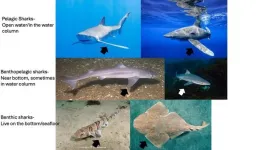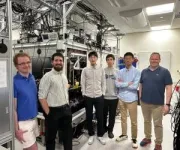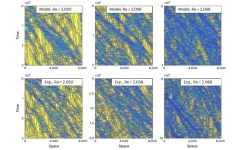(Press-News.org) The sharks we know today as the open ocean’s top predators evolved from stubby bottom dwellers during a dramatic episode of global warming millions of years ago.
A massive outpouring of volcanic lava about 93 million years ago sent carbon dioxide levels soaring, creating a greenhouse climate that pushed ocean temperatures to their hottest. UC Riverside researchers discovered that some sharks responded to the heat with elongated pectoral fins.
This discovery is documented in a paper published today in the journal Current Biology. It was made by taking body length and fin measurements from over 500 living and fossilized shark species.
“The pectoral fins are a critical structure, comparable to our arms,” said UCR biology doctoral student and paper first author Phillip Sternes. “What we saw upon review of a massive data set, was that these fins changed shape as sharks expanded their habitat from the bottom to the open ocean.”
Longer pectoral fins help make shark movements much more efficient. “Their fins are comparable to the wings of commercial airplanes, long and narrow, to minimize the amount of energy needed for movement,” Sternes said.
The researchers also saw that the open-water sharks got faster compared to bottom dwelling sharks. “Shark muscle is very sensitive to temperature,” said Tim Higham, professor in UCR’s Department of Evolution, Ecology, and Organismal Biology and paper co-author.
“The data helped us make a correlation between higher temperatures, tail movement, and swimming speeds,” Higham said.
Most living shark species are still bottom dwellers, occupying what scientists refer to as the benthic zone. These benthic sharks do not loom as large in popular culture as their fierce open-water relatives. Many of the bottom dwellers are slender, flatter, more medium-sized predators.
Only about 13% of modern sharks are fast-swimming open-water predators. The researchers believe that breathing may have become difficult for their ancient relatives. Oxygen levels near the bottom during the Cretaceous period likely dropped as the heat increased.
Modern sea surface temperatures average about 68 degrees Fahrenheit. In the Cretaceous they were much warmer, reaching an average of about 83 degrees. The high heat of the Cretaceous did not happen overnight, and neither did the sharks’ evolution.
“We had pretty warm open-sea surface temperatures throughout the era, and then a distinct spike that took place over a one- or two-million-year period,” said associate professor at Claremont McKenna College and paper co-author Lars Schmitz.
As global warming drove an evolution in some groups of animals, including sharks, it caused the extinction of others. Because those evolutionary changes happened on a longer time scale in the past, it is difficult to predict exactly how sharks or other marine life will respond to current warming trends.
Biologists are seeing some sharks, including tropical species like tiger and bull sharks, starting to swim farther north. But it is unclear whether threatened sharks will again be able to adapt where they live and survive the rapidly increasing heat.
“The temperature is going up so fast now, there is nothing in the geologic record I am aware of that we can use for a true comparison,” Sternes said.
END
How sharks survived a major spike in Earth’s temperature
Climate change was no problem for the big fish
2024-06-03
ELSE PRESS RELEASES FROM THIS DATE:
Cacao of Excellence announces the launch of the 2025 Edition of the Cacao of Excellence Awards
2024-06-03
[Rome, 3 June 2024] – Cacao of Excellence is delighted to announce the official launch of the 2025 Edition of the Cacao of Excellence Awards. Since its inception in 2009, Cacao of Excellence has been the premier platform for cacao producers to showcase the superior quality of their cacao, celebrating the diversity of flavours of cacao produced worldwide.
Held biennially, the Cacao of Excellence Awards bring together leading sensory evaluation experts and the chocolate industry to recognise and reward cacao producers who demonstrate excellence. The Awards offer the possibility for selected producers and the origins they represent to compete ...
The unexpected connection between brewing coffee and understanding turbulence
2024-06-03
In 1883 Osborne Reynolds injected ink into water in a short, clear pipe to observe its movement. His experiments showed that as the input water velocity increased, the flow went from laminar (smooth and predictable) to turbulent (unsteady and unpredictable) through the development of localized patches of turbulence, known today as “puffs.” His work helped launch the field of fluid mechanics, but, as experiments often do, it raised more questions. For example, why do these transitions between laminar and turbulent flows occur and how can the transitions be characterized quantitatively?
Although ...
Researchers call for return of Sumas Lake following devastating 2021 floods
2024-06-03
A new proposal has emerged in response to the November 2021 floods that swept Sumas Prairie in the Fraser Valley, British Columbia, causing mass evacuations and millions in damages.
Instead of rebuilding the dykes to manage water flows and prevent future floods, scientists at UBC, along with members of the Sumas First Nation and other research partners, suggest an alternative: let Sumas Lake, which was drained in the early 1920s and converted into the farmland known as Sumas Prairie, return to its natural state.
This ...
Transition-metal-free zeolite catalyst for direct conversion of methane to methanol
2024-06-03
In light of the waste-to-wealth movement, technology for converting greenhouse gases into value-added materials has gained significant attention in recent years. One such technology is the catalytic conversion of methane into methanol, a widely used industrial solvent and raw material for chemical synthesis. The industrial process for conversion of methane to methanol is extremely energy and resource-intensive. In the past decade, scientists have developed several catalyst systems that can enable direct oxidation of methane to methanol. However, most of them are based on ...
Retrospective study based on electronic health records finds popular diabetes and weight-loss drugs associated with reduction in incidence and recurrence of alcohol-use disorder by at least half
2024-06-03
CLEVELAND—A new study by researchers at the Case Western Reserve University School of Medicine reveals that the popular diabetes and weight-loss drugs Wegovy and Ozempic are linked to reduced incidence and recurrence of alcohol abuse or dependence.
The team’s findings, recently published in the journal Nature Communications, may suggest a possible new treatment for excessive alcohol use—including alcohol-use disorder (AUD), a health condition that causes about 178,000 deaths in the United States each year, according to the Centers for Disease Control.
To date, the U.S. Food and Drug Administration ...
Enhancing nanofibrous acoustic energy harvesters with artificial intelligence
2024-06-03
(LOS ANGELES) June 3, 2024 – Scientists at the Terasaki Institute for Biomedical Innovation (TIBI), have employed artificial intelligence techniques to improve the design and production of nanofibers used in wearable nanofiber acoustic energy harvesters (NAEH). These acoustic devices capture sound energy from the environment and convert it into electrical energy, which can then be applied in useful devices, such as hearing aids.
Many efforts have been made to capture naturally occurring and abundant energy sources ...
Research pioneer and paradigm-shifting thought leader for breast cancer precision medicine to receive the 2024 Szent-Györgyi Prize for Progress in Cancer Research
2024-06-03
June 3, 2024 (Rockville, MD)
The National Foundation for Cancer Research (NFCR) is announcing that the blue-ribbon selection committee, composed of world-renowned research leaders and visionaries, has awarded the 2024 Szent-Györgyi Prize for Progress in Cancer Research to Dennis J. Slamon, M.D., Ph. D. from UCLA Health for his groundbreaking research discoveries that helped to shape the field of precision medicine for breast cancer patients.
The cancer research community will celebrate Dr. ...
Assessing the environmental and downstream human health impacts of decentralizing cancer care
2024-06-03
About The Study: This cohort study found that using decentralization through telemedicine and local care may substantially reduce cancer care’s greenhouse gas emissions; this corresponds to small reductions in human mortality.
Corresponding Author: To contact the corresponding author, Gregory A. Abel, M.D., M.P.H., email gregory_abel@dfci.harvard.edu.
To access the embargoed study: Visit our For The Media website at this link https://media.jamanetwork.com/
(doi:10.1001/jamaoncol.2024.2744)
Editor’s Note: Please see the article for additional information, including other authors, author contributions and affiliations, ...
Telehealth can significantly reduce greenhouse gas emissions associated with cancer care, study finds
2024-06-03
BOSTON – Telemedicine visits for cancer care may not only be more convenient and easier to schedule than in-person appointments, they're also better for the planet, new research by Dana-Farber Cancer Institute scientists shows.
Based on an analysis of data from a regional cancer center, the researchers calculate that, nationwide, cancer care that utilizes telehealth and local care would generate 33.1% less greenhouse gas emissions than the traditional model of in-person care, primarily because of reduced travel to medical appointments. ...
Brain waves shape the words we hear
2024-06-03
The timing of our brain waves shapes how we perceive our environment. We are more likely to perceive events when their timing coincides with the timing of relevant brain waves. Lead scientist Sanne ten Oever and her co-authors set out to determine whether neural timing also shapes speech perception. Is the probability of speech sounds or words encoded in our brain waves and is this information used to recognise words?
The team first created ambiguous stimuli for both sounds and words. For instance, the initial sounds in da and ga differ in probability: ‘d’ is more common than ‘g’. The Dutch words dat “that” and gat “hole” ...
LAST 30 PRESS RELEASES:
Antarctica sits above Earth’s strongest “gravity hole.” Now we know how it got that way
Haircare products made with botanicals protects strands, adds shine
Enhanced pulmonary nodule detection and classification using artificial intelligence on LIDC-IDRI data
Using NBA, study finds that pay differences among top performers can erode cooperation
Korea University, Stanford University, and IESGA launch Water Sustainability Index to combat ESG greenwashing
Molecular glue discovery: large scale instead of lucky strike
Insulin resistance predictor highlights cancer connection
Explaining next-generation solar cells
Slippery ions create a smoother path to blue energy
Magnetic resonance imaging opens the door to better treatments for underdiagnosed atypical Parkinsonisms
National poll finds gaps in community preparedness for teen cardiac emergencies
One strategy to block both drug-resistant bacteria and influenza: new broad-spectrum infection prevention approach validated
Survey: 3 in 4 skip physical therapy homework, stunting progress
College students who spend hours on social media are more likely to be lonely – national US study
Evidence behind intermittent fasting for weight loss fails to match hype
How AI tools like DeepSeek are transforming emotional and mental health care of Chinese youth
Study finds link between sugary drinks and anxiety in young people
Scientists show how to predict world’s deadly scorpion hotspots
ASU researchers to lead AAAS panel on water insecurity in the United States
ASU professor Anne Stone to present at AAAS Conference in Phoenix on ancient origins of modern disease
Proposals for exploring viruses and skin as the next experimental quantum frontiers share US$30,000 science award
ASU researchers showcase scalable tech solutions for older adults living alone with cognitive decline at AAAS 2026
Scientists identify smooth regional trends in fruit fly survival strategies
Antipathy toward snakes? Your parents likely talked you into that at an early age
Sylvester Cancer Tip Sheet for Feb. 2026
Online exposure to medical misinformation concentrated among older adults
Telehealth improves access to genetic services for adult survivors of childhood cancers
Outdated mortality benchmarks risk missing early signs of famine and delay recognizing mass starvation
Newly discovered bacterium converts carbon dioxide into chemicals using electricity
Flipping and reversing mini-proteins could improve disease treatment
[Press-News.org] How sharks survived a major spike in Earth’s temperatureClimate change was no problem for the big fish








